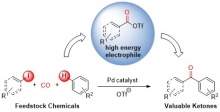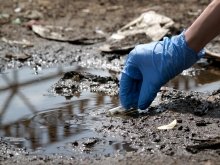Steps were taken in Canada to reduce the use of Bisphenol A (BPA), a toxic chemical linked to prostate and breast cancer, commonly found in plastics, the lining of food cans, water bottles, and paper receipts. But in many cases, it has been replaced with similar hormone disrupting chemicals, like Bisphenol S (BPS). A new study from McGill University shows that every day Canadians are exposed to BPS in the fresh foods they eat, as chemicals migrate from labels on the packaging materials into the food.


Researchers at McGill University have discovered a new, more environmentally friendly way to make ketones, an important chemical ingredient in pharmaceuticals. While ketones are found in a wide range of useful chemicals, they are commonly prepared through energy-intensive, multi-step technologies that create significant chemical waste. In an article published online last month in Nature Chemistry, the McGill scientists demonstrate how carbon monoxide, a widely available by-product of combustion, can instead be used to form high-energy chemicals that react directly with benzene to

Assessing the risks that toxic chemicals pose to natural ecosystems is a huge challenge, given the thousands of chemicals that require testing. But the task is expected soon to become less daunting, thanks to a new tool being developed by McGill University researchers.
